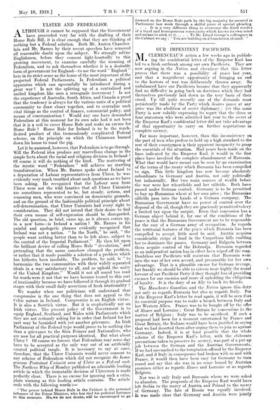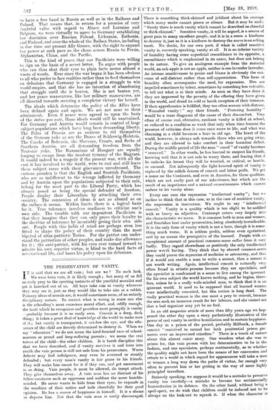OUR IMPENITENT PACIFICISTS.
MCLEMENCEAU'S action a few weeks ago in publish- . ing the confidential letter of the Emperor Karl has led to a fresh outbreak among our own Pacificists. They are now arguing in the Nation and elsewhere that this letter proves that there was a possibility of peace last year, and that a magnificent opportunity of bringing an end to the horrors of war was deliberately thrown away. So unbalanced have our Pacificists become that they apparently find no difficulty in going back on doctrines which they had themselves previously laid down as the very basis of their creed. Up till quite recently one of the demands most persistently made by the Party which desires peace at any price was the abolition of secret diplomacy ; yet this same Party is now volubly expressing its regret that the three or four statesmen who were admitted last year to the secret of the Emperor Karl's confidential letter did not take advantage of that opportunity to carry on further negotiations in complete secrecy.
Far more important, however, than this inconsistency on the part of men who profess to hold up a high standard to the rest of their countrymen is their apparent incapacity to grasp the essentials of the situation. Had peace been made on the lines indicated by the Emperor Karl, it would in the first place have involved the complete abandonment of Rumania. What that would have meant can be seen by an examination of the terms of the treaty which Rumania has been compelled to sign. This little kingdom has now become absolutely subordinate to Germany and Austria, not only politically but industrially. Her two main sources of wealth before the war were her wheatfields and her oilfields. Both have passed under German control. Germany is to be permitted to buy up Rumanian wheat at her own price ; the Rumanian oilfields pass into the hands of a German company. The Rumanian Government have no power of control over the disposal of the oil, though they are graciously permitted to levy a limited tax upon the output. Even that concession has a German object behind it, for one of the conditions of the peace is that the Rumanian Government are to be responsible for the cost of a German army of occupation. As regards the territorial features of the peace which Rumania has been compelled to accept, little need be said. Austria acquires considerable strips of land in the Carpathian hills enabling her to dominate the passes. Germany and Bulgaria between them acquire control of the Dobrudja. Rumania regarded as an independent nation has in effect been wiped off the map. Doubtless our Pacificists will maintain that Rumania went into the war of her own accord, and presumably for her own advantage. That is a plausible excuse for German revenge, but frankly we should be able to esteem more highly the moral fervour of our Pacificist Party if they thought less of providing excuses for our enemies and more of upholding the obligation of loyalty. It is the duty of an Ally to back its friends.
The Manchester Guardian and the Nation ignore this duty not only as regards Rumania but also as regards Italy. For if the Emperor Karl's letter be read again, it will be seen that its essential purpose was to make a breach between Italy and her Western Allies. France was to be bought off by the offer of Alsace and Lorraine ; Great Britain by concessions in the matter of Belgium ; Italy was to be sacrificed. If such a proposal had been for a moment entertained by France and Great Britain, the Italians would have been justified in saying that we had deserted them after urging them to join us against Germany. Indeed, it is at least possible that the whole scheme of the Emperor Karl's letter, with the elaborate precautions taken to preserve its secrecy, was part of a put-up job between the German and the Austrian Governments. If we had succumbed to the temptation offered by the Emperor Karl, and if Italy in consequence had broken with us and with France, it would then have been easy for Germany to turn round and say that she was in no sense bound by Austrian promises either as regards Alsace and Lorraine or as regards Belgium.
Nor was it only Italy and Rumania whom we were asked to abandon. The proposals of the Emperor Karl would have left Serbia to the mercy of Austria and Poland to the mercy of Germany. The fate of Russia was equally involved. It was made clear that Germany and Austria were jointly lo have a free hand in Russia as well as in the Balkans and Poland. That means that, in return for a promise of very doubtful value with regard to Alsace and Lorraine and Belgium, we were virtually to agree to Germany establishing her dominion over Russian Poland, Lithuania, Eathonia, and Finland, and over the whole of the Balkan States, including in due time our present Ally Greece, with the right to expand her power at such pace as she chose across Russia to Persia, Afghanistan, China, and the Pacific.
This is the kind of peace_ that our Pacificists were willing to sign on the basis of a secret letter. To argue with people who can thus shut their eyes to plain facts seems almost a waste of words. Ever since the war began it has been obvious to all who prefer to face realities rather than to feed themselves on delusions that Germany is engaged in a struggle to win world-empire, and that she has no intention of abandoning that struggle until she is beaten. She is not beaten yet, and her peace manoeuvres, like her military manoeuvres, are all directed towards securing a completer victory for herself.
The ideals which determine the policy of the Allies have been defined again and again. We are not near to their attainment. Even if peace were agreed to upon the basis of the status quo ante, those ideals would still be unattained. For Germany and Austria would remain in control of large subject populations which have long been demanding liberty. The Poles of Prussia are as anxious to rid themselves of the German yoke as are the Danes of Schleswig-Holstein. The Czechs of Bohemia, the Slovenes, Croats, and Serbs of Southern Austria, are all demanding freedom from the Teutonic yoke. The Rumanians of Hungary are equally longing to escape from the insolent tyranny of the Magyars. It would indeed be a tragedy if the present war, with all the cost it has involved to the world, were to end and still leave these subject races with their grievances unredressed. The curious paradox is that the English and Scottish Pacificists, who are so indifferent to the wrongs inflicted by Germany and by Austria upon the populations subjected to their rule, belong for the most part to the Liberal Party, which has always posed as being the special defender of freedom. People display their Liberalism by attacling their own country. The connexion of ideas is not so absurd as on the surface it seems. Within limits there is a logical basis for it. True tolerance involves readiness to criticize one's awn side. The trouble with our impenitent Pacificists is that they imagine that they can only prove their loyalty to the doctrine of tolerance by invariably giving their own side out. People with this habit of mind are perhaps even less fitted to shape the policy of their country than the most bigoted of ultra-patriotic Tories. For the patriot can under- stand the patriotism of other peoples, and make due allowance for it ; the anti-patriot, with his eyes ever turned inward to admire his own superior virtue, is blind to the hard facts of international life, and bases his policy upon his delusions.



























 Previous page
Previous page